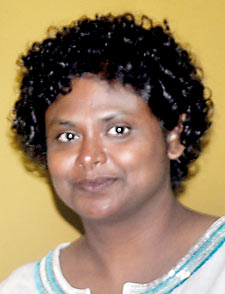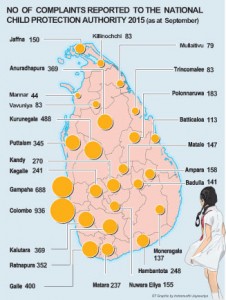News
NCPA calls for strict implementation of laws against child abusers
The National Child Protection Authority (NCPA) has called on authorities to strictly enforce laws against child abuse.NCPA Chairperson Natasha Balendra said there were 4,000 child abuse cases pending in courts.
Ms Balendra said more officers should be appointed to handle these cases and they also needed professional training. Under the Penal Code, the minimum sentence for child rape is 10 years while the maximum is 20. However, Ms Balendra pointed out that courts were reluctant to dispense even the minimum sentence of 10 years for offenders.

Natasha Balendra
She said the NCPA has also proposed to the Government to set up special courts in all provinces to handle child abuse cases in addition to introducing new mechanisms to speed up trials. In some instances it takes more than eight years even for a case to be heard.
Providing statistics, she said her Department has received 6,499 child related complaints for this year. Colombo district tops the chart with 936, while Gampaha and Kurunegala come second and third with 688 and 488 complaints respectively.
When it comes to the type of abuse, cruelty to children tops with 1,383 complaints. Distressingly there are 254 complaints related to rape and 184 categorised as grave sexual abuse. There are also 27 complaints of abduction and 106 cases of trafficking.
She stressed it was the responsibility of society to protect children, adding that, the father too should play a key role along with the mother, in protecting children, rather than intending to abuse them.
There has been a series of child abductions, rapes and killings in the recent past. From a schoolgirl in Jaffna to the rape and killing of a five-year-old in Kotadeniyawa a few days back.
“The Kotadeniyawe child rape and murder is a very unfortunate incident. We express our sadness regarding it. Entire society and parents in particular must be vigilant about the whereabouts of their children, with whom they travel and whether theses person are trustworthy,” she said.
Ms Balendra elaborated that the NCPA had also started focusing on awareness and prevention programmes islandwide. The NCPA’s District and Divisional Officers are working with village child protection committees and school child protection committees to encourage the communities themselves to take over the task of monitoring and ensuring the protection of their children.
She further added that the NCPA is working in collaboration with the RMV and the School Van Driver’s Association to make it compulsory for all school van drivers to have a “Public Transport” driving licence.

“This licence can be obtained only after the completion of a three-year period of the normal driving licence, and will include a precondition of a two-day course incorporating an awareness programme by the NCPA, and lectures by the police and the Health department,” she said.
Former NCPA Chairman Prof Harendra De Silva said that, 95% cases of child abuse are committed by persons known to the victim. Police need to understand that only a known person would abduct or kill a child. Unknown people would only sexually abuse the children and abandon them.
“This is a responsibility of the Government to understand the situation and strengthen the law as effectively as possible. If this problem is allowed to continue, then we are depriving the future of the generations to come.”
“This is not the first time this kind of incident took place. Today, advances in communication and social media sites such as Facebook facilitate rapid transmission of information. Even something very common is being highlighted on these sites to make it look like a growing trend.”
“The other reason why this is happenning is because Sri Lanka is a highly traumatised country, by years of civil war, violence and torture. I would say that impunity is being tolerated and, as a result, violence has become commonplace among the people.”
“Under Penal Code amendment No.22 of 1995, many changes have been made to the laws of the country – minimum age of ‘consent’ in the offence of rape has been increased from 12 to 16 years. The law in this country is not effective, or I would rather say that the law is only effective in some quarters.”
| Hotline Hotlines 1929 and 1938 to report instances of child abuse and abuse of women are available round-the-clock. |
“Today’s abused will become tomorrow’s abusers,” he quoted, adding that, child abuse comes in four different forms such as physical, sexual, psychological or emotional and neglect. Physical abuse involves physical aggression directed at a child by an adult causing harm to the child’s health, existence, development and dignity.”
Speaking to the Sunday Times, civil society activist and founder of Women and Media Collective, Kumudini Samuel stated, “Rape is undoubtedly a serious act of violence committed against women and girls or anyone for that matter.”
The existing court proceedings also re-victimise women, discouraging them from seeking justice. In many cases, men who committed the crime are either politically influential or someone within the family, or known to the family, and therefore, often adversarial.
Director and Consultant Psychiatrist of National Institute of Mental Health, Dr Jayan Mendis said a child who has been sexually abused would be irritable and suffer sleep disorders.
“The child may complain of headaches or tummy aches, and suffer udden fainting spells. As adults some will suffer from depression while others may become aggressive with violent personalities,” he added.

